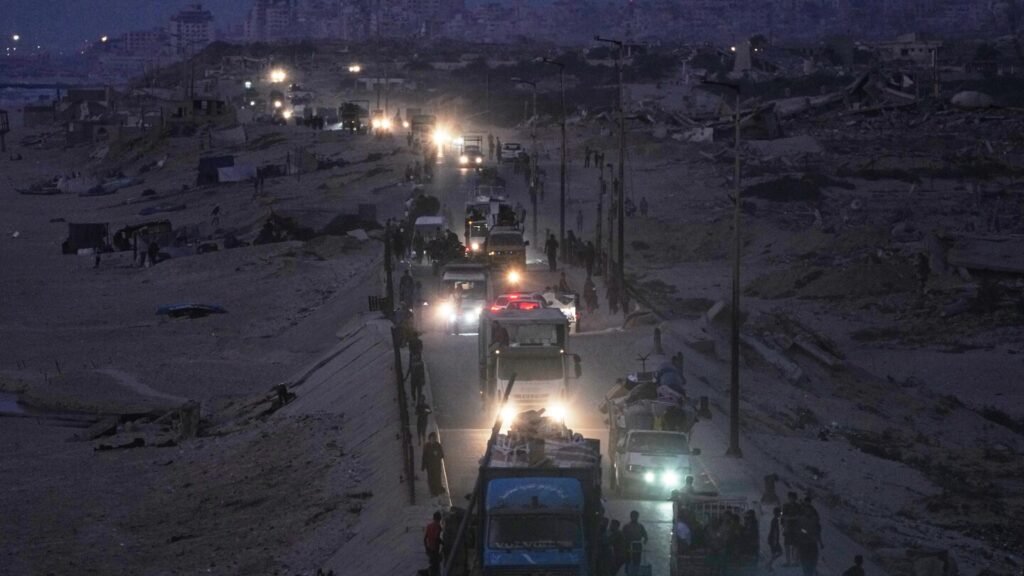Ongoing Conflict in Gaza: An Overview of Recent Developments
Casualties and Humanitarian Impact
On Saturday, health officials reported that Israeli airstrikes and gunfire resulted in the deaths of at least 59 individuals across the Gaza Strip. This grim toll comes amid escalating international calls for a ceasefire and negotiations over the return of hostages. Despite mounting pressure, Israeli Prime Minister Benjamin Netanyahu remains steadfast in his commitment to continue military operations in the region.
Among those killed were victims of two separate strikes in the Nuseirat refugee camp, where nine members of one family died in their home, followed by an additional 15 casualties, including women and children. These tragic events were reported by staff at al-Awda Hospital, the site where the bodies were taken. Five additional individuals lost their lives when an airstrike targeted a tent sheltering displaced families, as reported by Nasser Hospital.
Simultaneously, Israel’s military has denied any knowledge of strikes in the Nuseirat area or fatalities from gunfire in southern Gaza. Concerns regarding hospital operations have also been raised, with Dr. Mohamed Abu Selmiya from Shifa Hospital informing AP News that medical teams are wary of Israeli tanks advancing near the facility, greatly restricting patient access.
International Pressure for Ceasefire
Prime Minister Netanyahu’s recent speech at the U.N. General Assembly emphasized his resolve to "finish the job" against Hamas, despite the presence of 48 hostages believed to be held captive in Gaza. The speech triggered a mass walkout from delegates across various nations, demonstrating Israel’s growing isolation on the world stage.
Itzik Horn, the father of Eitan Horn, one of the hostages, expressed his frustration, stating, “If you don’t bring a comprehensive agreement and end the war, you will forever be a leper.” These poignant remarks underscore the emotional turmoil families are experiencing as they await the return of their loved ones.
As the urgency for a ceasefire grows, various countries have recently begun recognizing Palestinian statehood. This development increases diplomatic pressure on U.S. President Donald Trump to intervene in favor of a cessation of hostilities. A meeting between Trump and Netanyahu is scheduled for Monday, escalating expectations for an international resolution.
During a protest in Tel Aviv, Doron Steinbrecher, a former hostage, called upon Trump to prioritize the hostages’ safe return. In Jerusalem, Eli Cohen, an uncle of Inbar Haiman, echoed this sentiment, urging efforts to bring their loved ones back home—"as if she were alive."
Humanitarian Crisis Intensifies
The situation in Gaza continues to deteriorate, with hospitals nearing collapse under the strain of ongoing airstrikes and overwhelming demand. Reports indicate that two clinics have been destroyed and hospitals face severe shortages of medicine, equipment, and food. Many health professionals have evacuated, leaving only a handful of staff members to care for critically ill patients.
“Doctors Without Borders**’ recent suspension of operations in Gaza City illustrates the growing risks. The organization cited the proximity of Israeli tanks posing an ‘unacceptable risk’ as the primary reason.
As humanitarian access wanes, communities find themselves increasingly deprived of essential supplies. Israel has halted aid deliveries through key crossings, exacerbating food insecurity in northern Gaza. Individuals fleeing from Gaza City report exorbitant food prices, with many relying on charity kitchens, which often run out of offerings before they can be served.
Increasing Civilian Casualties
Israel’s military campaign has reportedly resulted in the deaths of over 65,900 individuals, with more than 167,000 injuries, based on statistics from Gaza’s Health Ministry. While specific numbers of civilian fatalities versus combatants are unclear, reports suggest that women and children constitute a significant portion of the casualties.
This ongoing conflict was triggered on October 7, 2023, when Hamas militants executed a surprise attack into Israeli territory, resulting in approximately 1,200 deaths and the abduction of 251 individuals.
Conclusion
The situation in Gaza remains critical, marked by escalating violence, significant casualties, and severe humanitarian crises. As international pressures mount for a ceasefire and negotiations, the future remains uncertain for the victims of this ongoing conflict. Access to necessary resources continues to dwindle, adding to the urgency for a sustainable and peaceful resolution. For ongoing coverage of the situation, you can follow developments at the Associated Press.


